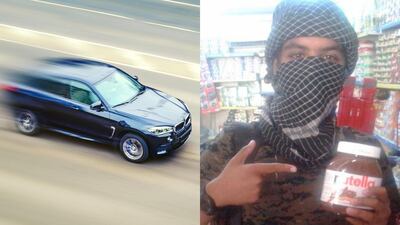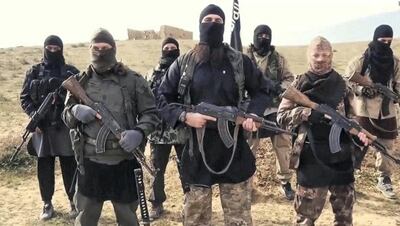ISIS fighters have taken luxury cars and home comforts, including chocolate spread Nutella, to Syria often at the expense of European taxpayers.
The lifestyles of the foreign fighters have come to light in social media posts by the group in its bid to woo more recruits.
Radicalisation experts say many hired BMWs to drive across Europe to join the terror group taking with them luxuries such as Nutella.
Terrorism expert Pieter van Ostaeyen said recruits travelling from France and Belgium would hire high-performance cars and arrive in style to war zones.
In one case, evidence was found of one recruit being charged import tax in Syria for his luxury car.
Mr van Ostaeyen said these individuals would target impressionable youngsters back in their home nations, for recruitment.
“We have seen a photo of a bunch of women standing in front of a white BMW, they went from France and basically drove all the way to Syria,” he said.
“One of the attackers in the Paris attack drove his car all the way from France to Syria and got fined for importing the car, and we know of a Belgium foreign fighter who rented a BMW and drove all the way through Europe, the Balkans to Turkey to reach Syria.
“As soon as these guys arrived in Syria they began recruiting people via social media. They were recruiting young girls and boys using jars of Nutella and kittens.”
Describing the recruitment tactics as “really successful”, Mr van Ostaeyen added: “We do not have any figures confirming how many people were recruited via social media but it must have been a very big deal and many people ended up in Syria as a result.”
A built-up cache of battlefield evidence is increasingly helping authorities to bring them such materialistic terrorists to justice.
Mobile phones containing wedding invites and emails left by the terrorists are being used for prosecutions in European courts.
Mr van Ostaeyen said the foreign fighters’ lifestyles were often financed by social security benefit payments from their home nations, and revealed many Belgian fighters received thousands of pounds of taxpayers’ money, while based in Syria.
“As soon as they started leaving for Syria their journeys were paid for by friends and family members and they got donations from bitcoin,” he said.
“Some of the Belgium fighters kept on receiving allowances even though they were not living in Belgium and even though they had registered as terrorist fighters they kept on receiving money from the government.”
In a webinar, hosted by the Counter Extremism Project, experts explained that key recruiters also helped facilitate their journeys, weapons and training.
It highlighted the role of hate preachers like Britain’s Anjem Choudary in recruiting youngsters.
The London-based Islamist has been linked to 15 terrorist plots dating back almost 20 years and has been connected to hundreds of Britons who fled to Syria to fight.
He is believed to have influenced the Sharia4Belgium group, which played a significant role in the growth of extremism in Belgium, and took inspiration from Islam4UK - a group once led by Choudary.
Mr van Ostaeyen highlighted the role of Sharia4Belgium’s now-deceased former leader Houssien Elouassaki in being “very successful” in recruiting people via social media from the battlefield.
He said there are still 155 Belgian ISIS fighters unaccounted for.
“We do not know where they are, if they got killed or if they merged with local cells,” he added. “Of course there is a big risk of them returning uncontrolled.”
In July, the UN Security Council’s Counter-Terrorism Committee Executive Directorate warned European governments of the “urgent” need to adopt a uniform plan for the repatriation of ISIS fighters, as thousands are set to return home.



